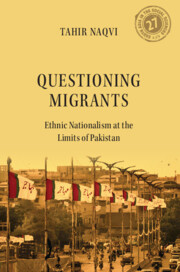Prelude: Ilaaqa Ghair – Sensing Urban Violence/Becoming a Nation
Published online by Cambridge University Press: 13 November 2024
Summary
The ethnic panic spawned by the riots of the mid-1980s allowed the Muhajir Qaumi Movement (MQM) to come to the forefront of a process of ethnic fortification and siege, culminating in the creation of MQM-controlled “no-go areas” (ilaaqa ghair). The movement's militant inscription of Muhajirs as an urban ethno-majority involved the use of violence to expel non-Muhajir concentrations in the cities of the province. It also included the creation of a network of local “unit” offices that mapped onto Karachi's existing union council (UC) structure (whose grounded transformation of this apparatus of extra-constitutional political regulation is recounted in the next chapter). This was quickly followed by the dispersal of violent territorialism in most of the city's lower-income Muhajir strongholds, leading to the entrenchment of practices of private government and criminal accumulation that primarily ended up targeting members of the Muhajir community. In Karachi, much of this violence has been propagated by MQM recruits, comprised primarily of Pakistan-born Muhajir men from the city's middle- and lower-class neighborhoods. As I came to learn, part of the experience of life in the no-go area at this time meant dealing not only with the immediate threat of intrusion by an ethnic other but with the existence of a new brand of strangers within, in the form of newly galvanized activists. The latter's willingness and capacity to use violence against members of their own ethnic/local communities poses significant questions about the role of ethnicity, democratic power, and urban space in constituting the subject of Muhajir nationalism.
The MQM's sudden mobilization of Karachi's Muhajir youth gave rise to transgressive expressions of political sociality, “fun” and “spectacle” that challenged elite, official, as well as certain generational doxas of nationhood and urban life (Verkaaik 2004). Oskar Verkaaik argues that ethnic violence has consequently “helped create Muhajir political identity” (Verkaaik 2016). This insight aligns with the work of Nichola Khan on Muhajir militancy. According to Khan, the violence enacted by MQM militants is not just destructive but also “generative insofar as it restores or intensifies the self” (N. Khan 2017: 43).
- Type
- Chapter
- Information
- Questioning MigrantsEthnic Nationalism at the Limits of Pakistan, pp. 107 - 113Publisher: Cambridge University PressPrint publication year: 2025

